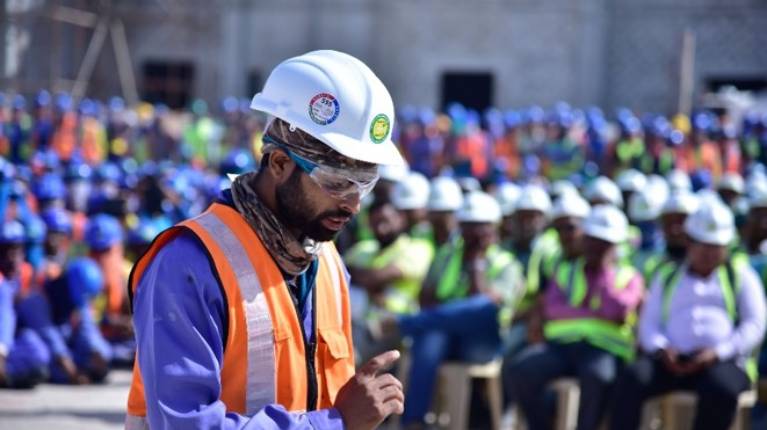Qatari authorities have yet to respond to Doha News’ request for a comment.
Some workers at the Bin Omran Trading and Contracting (BOTC), a prominent firm covering World Cup related projects, have not been paid over the past five months, according to a Human Rights Watch (HRW) report.
By delaying the workers’ payments, BOTC is guilty of violating Qatar’s labour laws.
The rights group stated that employees at BOTC, which has more than 6,700 workers, have filed several complaints to Qatari authorities over the past few months. According to HRW, the workers have yet to receive a response.
HRW said that it had informed Qatari authorities about the labour law violations at BOTC on 8 February and has not received a response from them since then. Employees at the company have also filed complaints to the Labour Ministry, the Labour Court, the Qatari police, and the National Human Rights Commission last month.
“Employees said that the Qatari police assured them that they would be paid by the end of February. However, a BOTC employee told Human Rights Watch that as of March 3, they had failed to meet this promise and they had still not been paid,” said HRW.
Workers demanding action after salaries and passports withheld
Qatari authorities have yet to respond to Doha News’ request for a comment. Doha News also tried calling and emailing BOTC on Sunday, and has not received a response from them.
One employee told HRW that salaries were delayed between 2018 and 2020 by two-to-five months.
“Every month they used to send us salary memos saying payments will be on time from the following month but they were false assurances. There wasn’t a single month when we were paid on time, it was always a delayed payment,” said the worker.
In 2015, Qatar introduced the government’s Wage Protection System (WPS), under which authorities ensure that workers receive their payments through direct bank transfers by the seventh day of each month.
In 2018, Sheikh Tamim bin Hamad Al Thani issued issued Law No. 17 in 2018 to establish the Workers’ Support and Insurance Fund, to protect workers from overdue or unpaid wages.
“The employees interviewed said that the total size of BOTC’s workforce has declined in recent months as employees have left either because their contracts were completed or terminated or wage abuse,” said HRW.
Despite the presence of systems in Qatar to protect workers, some companies have appeared to find loopholes to avoid accountability.
Some workers protested the delay in wages by not working whilst continuing to go to their worksites to merely mark their presence.
Threatening workers
Despite not paying the employees, BOTC reportedly sent out memos to the workers threatening to reduce their wages if they do not keep working.
The memo would also be a violation of the International Labour Organization’s Forced Labour Convention No. 29, under which workers cannot be forced to work without pay and under threats.
Workers told HRW that they are living under stressful conditions as they have families to feed whilst ensuring that their children’s school fees are paid. The company still reportedly owes money to “hundreds” of former employees, who either worked at other companies or moved back to their home countries.
BOTC has major projects at key 2022 World Cup stadiums, including Al-Bayt Stadium, the roads surrounding the stadium, and the New Orbital Highway project. The company’s website states that the projects are worth hundreds of million of dollars.
HRW has called on FIFA to establish a system that looks into abuses of workers’ rights in the Gulf state whilst compensating them for their delayed salaries.
“With less than nine months to go until the 2022 FIFA World Cup, migrant workers who are making the games possible under difficult and sometimes dangerous conditions face repeated delayed and unpaid wages,” said Michael Page, deputy Middle East director at HRW.
The latest HRW report echoes a previous one released in December 2020, where it revealed that Imperial Trading and Construction Company (ITCC) and Lalibela Cleaning and Services were carrying out similar violations of Qatar’s labour law.
“The BOTC case demonstrates that Qatar’s measures to end wage abuse are failing to protect migrant workers, leaving companies to continue their violations of labour and human rights in impunity,” said Page.
Qatar’s historic labour reform
Qatar’s Ministry of Labour (MOL) has been doubling its efforts to monitor companies that violate the country’s workers’ rights. More recently, it started naming companies that it has shut down for carrying out such offences.
In May last year, the MOL launched a new platform for workers’ to lodge complaints regarding their workplaces for failing to abide by the country’s labour laws. In December alone, the MOL received over 2,000 thousand labour complaints.
In 2021, Qatar introduced the region’s first ever non-discriminatory minimum wage law, where employers are obligated to pay allowances of at least 300 QAR for food, 500 QAR for housing on top of the minimum monthly basic wage of 1,000 QAR.
Companies that pay their employees less than the minimum wage face one-year in jail and a 10,000 QAR fine.
In 2020, Qatar was the first country in the region to dismantle the controversial ‘Kafala’, or sponsorship, system.
Follow Doha News on Twitter, Instagram, Facebook and Youtube







